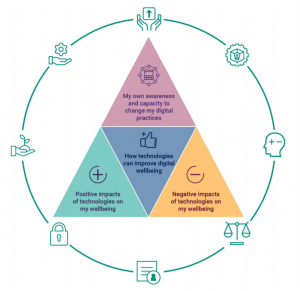During these unprecedented times, you are showing remarkable resilience to adapt. Within days of full lockdown, strategic plans were being rolled out across the UK to move learning online and ensure that students could still access their learning. At Jisc we haven’t underestimated the scale of this challenge. The stress and additional burden on you during an already busy time in the academic calendar must be immense, so we want to support you in any way we can. Below are some strategies to look after your digital wellbeing along with links to additional resources which you may find helpful.
Remember to take proper breaks
On campus, it’s easier to move away from a screen as you walk to different places and meetings. It forces you to take a digital break. When at home, this becomes harder and there can be an expectation that you are always on hand to support members of your educational community. It’s important to give yourself some down time and allow yourself to move around. To help with this, schedule in regular digital breaks that you stick to. Something that’s really helping us in Jisc is only meeting for 45 minutes rather than an hour. This gives us fifteen additional minutes for a proper reset, refreshments and some headspace to prepare for upcoming conversations.
Recognise and manage the fatigue of isolation
Campuses are a hive of activity. A community pulling together to better the lives of others. It’s been hard to appreciate our reliance on social contact until it was completely taken away from us. Isolation can be draining, and some days are harder than others. If you start to recognise this fatigue, it can be helpful to check in with your colleagues remotely as well as keeping yourself sharp mentally through exercising. Exercise is a proven way of combatting tiredness (opens in new tab) and will help you feel better afterwards.
Manage expectations and communicate
Trying to adapt to such a big change in learning delivery isn’t easy. You are going to have a lot of requests and competing priorities from colleagues. The solution to this is not to work yourself into the ground and make yourself ill. Clear communication and expectation management will help immensely, but if you feel things are getting on top of you, reach out to your support network for assistance. Educational institutions are great at sticking together through hard times and you aren’t in this on your own.
Additional wellbeing resources
For those of you who are supporting other colleagues or students, you may be interested in our wellbeing briefings for senior leaders and practitioners (opens in new tab). Included within these is the below model which highlights four important aspects of digital wellbeing for individuals along with eight good practice principles. These are expanded in the papers offering valuable advice and guidance for staff.

Additionally, we recently published an article on the digital wellbeing of learners (opens in a new tab) which is packed full of useful information, effective collaborations and tips to help you thrive in the current challenges.
This is an uncertain and extraordinary time across education, but we must continue to look after ourselves and those around us. If there is anything else that we can do at Jisc to support you through the challenges ahead, please reach out to us.
